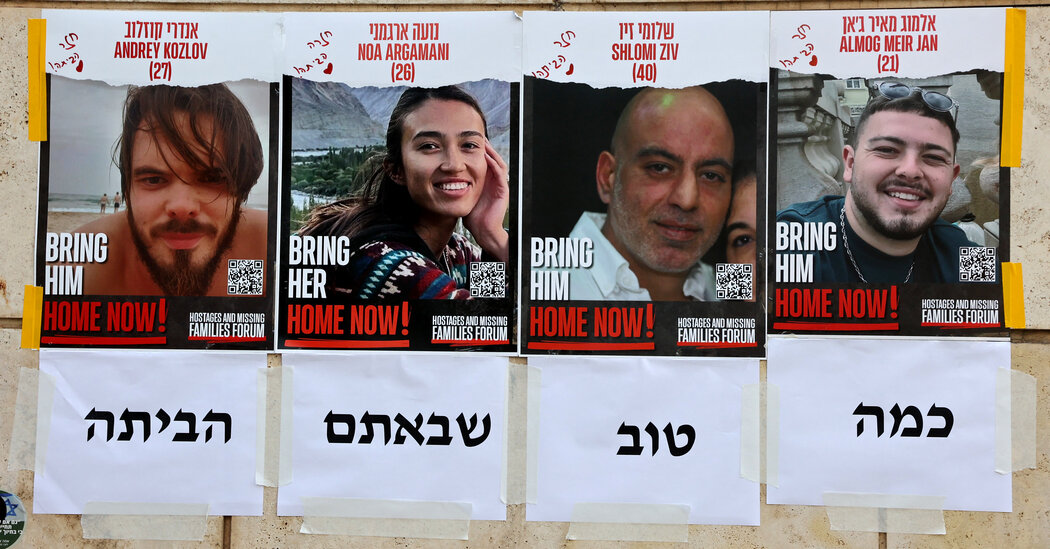Following the Israeli rescue of four hostages in Gaza on Saturday, Israel’s military said that three of them had been held in the home of a member of Hamas, which it said showed that the armed group was using civilian homes to shield its activity.
Israeli special forces, backed by the military, intelligence and air force, raided two buildings in a neighborhood in Nuseirat, a refugee camp in central Gaza on Saturday, rescuing Almog Meir Jan, 22; Andrey Kozlov, 27; and Shlomi Ziv, 41, from the home of Abdallah Aljamal, the military said. A fourth hostage, Noa Argamani, 26, was also freed, apparently from a nearby building.
Speaking of the first three, the military said in a statement on Sunday on the Telegram messaging app: “The hostages were held captive by Abdallah Aljamal and members of his family in their home. This is further evidence of the deliberate use of civilian homes and buildings by the Hamas terrorist organization to hold Israeli hostages captive in the Gaza Strip.”
Israel’s military has said for months that civilian casualties in Gaza are inevitable because Hamas hides its forces within the population.
However, the Israeli military appeared to be stepping back on Monday from its post a day earlier on the X platform, formerly Twitter, that implied that Mr. Aljamal was not only a member of Hamas but also a journalist for Al Jazeera, an influential news organization based in Qatar.
In that post, the military showed what appeared to be a screenshot of a photo and brief biography of Mr. Aljamal on the news organization’s website. “No press vest can make him innocent of the crimes he has committed,” the post said, adding, “Al Jazeera: what’s this terrorist doing on your website.”
Al Jazeera refuted the accusation on Sunday, saying that “these allegations are completely unfounded” and that Mr. Aljamal had “never worked” for the network. Rather, it said, he had contributed to an op-ed in 2019. A search of Al Jazeera’s website for his byline surfaces a co-written opinion piece from January of that year collecting accounts of six Palestinians who had been held in Israeli prisons. News organizations frequently publish opinion pieces from contributors who are not on staff and with whom they have no ongoing contractual relationship.
Al Jazeera is a major source of news in the Arab world and has highlighted civilian suffering in Gaza. Prime Minister Benjamin Netanyahu has accused it of harming Israel’s security and inciting violence against its soldiers. The news organization has been under a temporary ban from operating in Israel since May 5 — an unusual step that critics denounced as anti-democratic and part of a broader crackdown on dissent over Israel’s war against Hamas in Gaza.
A 35-day ban on Al Jazeera’s operations in Israel was extended by an additional 45 days last Wednesday, after the Israeli cabinet agreed Al Jazeera’s broadcasts posed a threat to security.
On Monday, the Israeli military said it had no comment on Al Jazeera’s rebuttal, referring a Times reporter back to its Sunday Telegram post, which identified Mr. Aljamal only as a member of Hamas. However, Israel’s Ministry of Foreign Affairs continued to amplify the accusation that he was connected to Al Jazeera, reposting on Monday a report by The New York Post that cited the military’s Sunday post on X.
It was not possible to ascertain independently whether the hostages had been held in Mr. Aljamal’s home and, if so, under what circumstances. It was also not possible to determine whether he had been killed in the raid.
Given that Abdallah Aljamal is a relatively common name in Gaza, it was also not possible to be certain that the person who wrote the op-ed was the same person whose home Israel’s military said was used to hold the hostages.
According to a preliminary estimate by the Committee to Protect Journalists, more than 100 journalists and media workers have been killed during Israel’s campaign in Gaza, which began on Oct. 7 when Hamas launched an attack on Israel. It calls that an unprecedented toll on Palestinian journalists.
Israeli officials have said that they believed that some of those journalists were also members of Hamas, an assertion that serves to cast doubt on the neutrality of some of the reporting conducted by Palestinian journalists. Because foreign media are barred from entering the enclave outside of special tours closely monitored by the military, Palestinian journalists have become a crucial source of information about prosecution of the war and its impact on civilians.
